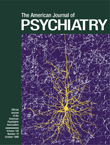Enhancement of CO2-Induced Anxiety in Healthy Volunteers With the Serotonin Antagonist Metergoline
Abstract
OBJECTIVE: The mechanism of action of CO2-induced anxiety is unknown and has been little studied. The authors studied healthy volunteers for the possible influence of serotonin (5-HT) on CO2-induced anxiety. METHOD: Fourteen healthy volunteers received two vital capacity inhalations each of 35% CO2 and of air, preceded once by placebo and once by the 5-HT antagonist metergoline in a double-blind, randomized crossover design. RESULTS: Mean National Institute of Mental Health self-rating anxiety subscale scores increased nonsignificantly after CO2 inhalation; this effect was significantly enhanced by the administration of metergoline. CONCLUSIONS: The authors hypothesize that 5-HT may inhibit CO2-induced anxiety, a function that is lessened by metergoline.



